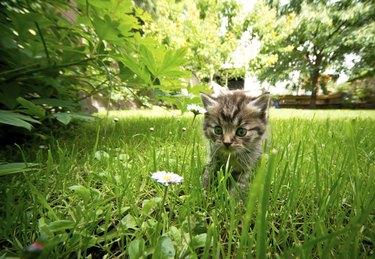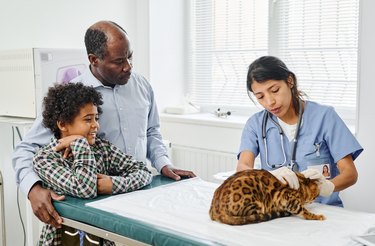You're playing with your cat, and you're about to give them a little boop on the nose when you notice what looks like a sore or scab. Don't panic. Nose sores on cats have numerous sources, and most are highly treatable. The most common causes include animal bites, fungal infections, parasites, and skin infections. In more serious cases, tumors or cancerous growths may be the cause. If your cat has nose scabs or sores, segregate them from other household pets and contact your veterinarian for an examination and proper diagnosis.

Video of the Day
Fungal or parasitic infections in cats
Crustiness on your cat's nose can be a sign of ringworm, a contagious fungal infection often seen on the nose and face of cats. Fleas can also cause sores on the nose, especially if your cat has an allergy to flea saliva. Some skin conditions, such as allergic dermatitis and bacterial or yeast infections, can result in inflamed patches of skin.
Video of the Day
Cats experiencing allergic reactions, injury, and trauma
Cats are curious by nature. Your cat may have stuck their nose where it doesn't belong, such as into a toxic plant or chemical container. Insect stings and bug bites can also produce swollen welts, especially if your cat is allergic. Run-ins and fights with wild or domestic animals can lead to bites, scratches, and open wounds or hot spots. For those types of injuries, make sure to thoroughly clean your pet's wound to prevent infection.

Cats with mange or scabies
Mange, or scabies, is caused by a tiny mite and usually results in rashlike sores on the nose, face, and ears. While more common in dogs than in cats, it can be contagious and is usually seen in poorly fed cats or those with a weak immune system. Treatment calls for eliminating the mites with medicated shampoo or alternative home remedies for mange.
Squamous cell carcinoma on a cat's nose
Often mistaken for a minor abrasion, squamous cell carcinoma starts as a small, scabby sore. The most common form of cancer to occur on the feline nose, squamous cell carcinoma, is highly treatable if caught early. Both outdoor and indoor cats who spend a good deal of time in sunlit areas can be more susceptible to nose pad cancer. A biopsy is usually taken as part of the diagnostic process.
Calicivirus infections in cats
Feline calicivirus can cause respiratory infection and oral disease in cats. Ulcerations on the nose and mouth are among the symptoms. Calicivirus is highly contagious, spreading through saliva and nasal secretions, and when an infected cat sneezes, airborne particles can spread several feet. Numerous strains with varying symptoms exist. While antibiotics may be prescribed for ulcers that have developed a secondary bacterial infection, uncomplicated symptomatic home treatment is usually recommended.

Diagnosis and treatment of sores on cats
Your veterinarian may do a skin scrape, which is collecting a sample of cells from the affected area to examine under a microscope. They might also use the sample for a bacterial or fungal culture. Additionally, they may conduct blood tests to aid in the diagnostic process.
Treatment will vary based on the cause of the sores. Bacterial infections are treated with antibiotics and anti-inflammatories. Anti-fungal medications are used for fungal infections, and topical cortisone creams and antihistamines are used for allergic reactions. If your cat has a cancerous nose tumor, surgery and chemotherapy may be recommended.
In summary
Sores on cats range from minor cuts and scratches to symptoms of serious disease. Unless you are certain that your cat's nose sore is nothing more than a minor injury from, say, a run-in with another animal, it is best to get it checked out by your veterinarian. The potential causes are numerous, and a proper diagnosis can only be made by a professional. While most are straightforward and nonthreatening, some are serious and need immediate attention to prevent progression of disease. When it comes to cat nose sores, there is no better advice than "better safe than sorry."